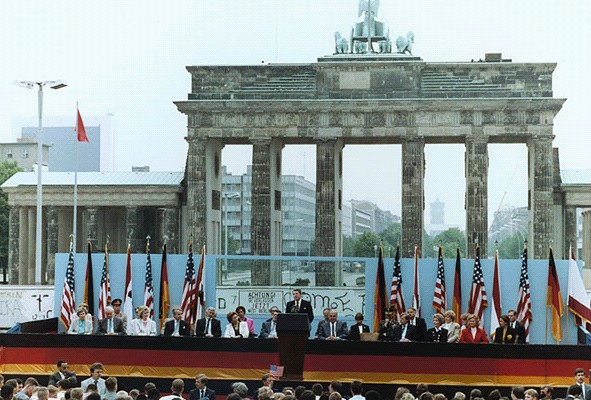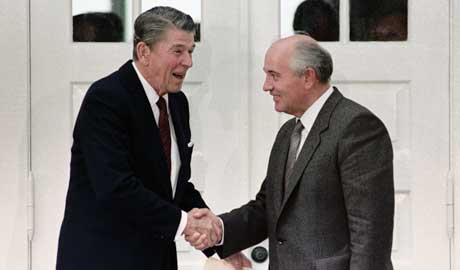- Former US President Ronald W. Reagan, June 12, 1987.
In the end, the Cold War was won by defeating the Soviet Union, a novel concept.
In arguably the West´s darkest moment, Ronald Wilson Reagan, a former actor and governor of California, and Margaret Thatcher, the daughter of a humble grocery store owner, were elected president of the United States (1980) and prime minister of the United Kingdom (1979) respectively. This dynamic duo would steer the West to victory against tyranny.
 In 1980, the United States was reeling from twin humiliating reversals: the ghosts of Vietnam and the 444-day hostage drama at the hands of Islamic Republic of Iran, both inflation and unemployment were in double digits and above all US morale was flagging. The Soviets had invaded Afghanistan and the strategic balance in Europe favored Moscow with its deployment of mobile SS-20 missiles. The challenge was cast. Washington and London readily accepted.
In 1980, the United States was reeling from twin humiliating reversals: the ghosts of Vietnam and the 444-day hostage drama at the hands of Islamic Republic of Iran, both inflation and unemployment were in double digits and above all US morale was flagging. The Soviets had invaded Afghanistan and the strategic balance in Europe favored Moscow with its deployment of mobile SS-20 missiles. The challenge was cast. Washington and London readily accepted.US President Reagan defied the ruckus of KGB-funded peace movement in West Europe and deployed Pershing II and cruise missiles throughout Nato countries to counter the Soviet threat. He finally had a summit with Mikhail Gorbachev in Reykjavik, Iceland, after a series of Soviet leaders died in office over what became the INF (Intermediate Nuclear Forces) Treaty to scrap these missiles.
In a departure from past negotiations, Reagan negotiated from strength: the largest military buildup since Vietnam and an ace in the hole - the Strategic Defense Initiative (SDI) derided by the naive Western news media as ´´Star Wars´´ to discount its realistic function and purpose - creating a missile shield to protect the West from Soviet missiles. His vision then is still inspiring today.
Mr. Gorbachev knew the danger SDI posed to Moscow. The technological gap persisted throughout the Cold War after the Soviets launched Sputnik first in expanding competition into space. The introduction of anti-aircraft missiles in Afghanistan and the rugged mujahideen created the ´´Soviet Vietnam.´´ His perestroika (restructuring) and glasnost (opening) policies lulled the naive Western media, but they were futile attempts to reform and save communism from the dustbin of history. His hand was forced by SDI and the iron will of mainly Reagan and Thatcher backed by credible military force to end the communist menace. Any credit to Mr. Gorbachev is in recognizing the defeat of the Soviet Union.
In the end, visionary leaders, iron nerve backed by strength, and technology gave a strong push to cause the ailing Soviet Union to fail and condemn its brand of communism to the deathbed.
Get your International Policy




No comments:
Post a Comment